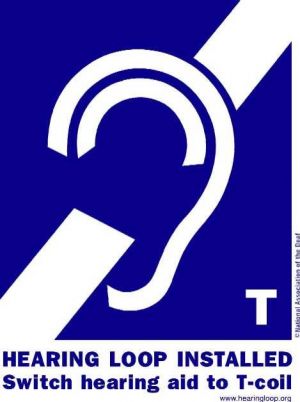|
www.HealthyHearing.com |
ADA guidelines and regulations for the hearing impaired
Contributed by Temma Ehrenfeld Many laws protect people with hearing loss—but these days they all need to be interpreted in a world of changing technology. The preeminent law that protects the hearing impaired is the Americans with Disabilities Act (ADA), which was signed into law in 1990. The three titles of the ADA:

disabilities, including hearing loss. Even if a cochlear implant or hearing aid largely addresses your limitations, you are still considered to have a legal disability under the ADA, which means you can expect certain protections and accommodations. However, as technology rapidly changes and more services move online, the definition of discrimination has been a moving target. For example, was it discrimination for the video chat service Zoom to charge more for closed-captioning on video calls? In December 2020, two hearing-impaired men sued over the issue, citing violations of ADA and California and New York law. In March 2021, Zoom made it possible to sign up for free live captioning (you can only turn it on as a meeting host) and the company promises to make it free for everyone in the fall. Making the internet accessible for people with hearing lossThis debate arises mainly because the ADA, written in the very early days of the internet, doesn’t specifically address websites. Judges have ruled differently on whether "places of public accommodation" includes websites or apps that don’t have a physical location. The U.S. Department of Justice has said that it does, but hasn’t issued regulations. The DOJ is responsible for enforcing federal laws, seeking changes and civil penalties. But class-action discrimination suits, which have been increasing rapidly, are more common. Dominos, Netflix, and Target all changed their websites under pressure from private lawsuits. While we all await more guidance, many states have instituted their own rules or adopted web accessibility guidelines published by the World Wide Web Consortium (W3C). Under those guidelines, people with impaired vision should be able to see and read a website, and it should be easy to integrate with tools used by people with disabilities. Closed captions and transcripts should be available for all prerecorded audio and video, for example. However, as anyone who has ever used YouTube knows, this is not a guarantee. Telephone accessibilityThe law is a bit more clear for telephone systems, which must be available to people with hearing and speech disabilities. Your options include captioned telephones and web-based captioning apps and services. The 1988 Hearing Aid Compatibility Act required that all telephones (including cell phones) be compatible with hearing aids. The 21st Century Communications and Video Accessibility Act (CVAA), signed by President Obama and enacted in 2010, required text messaging, e-mail, instant messaging, and video call services to be accessible to people with disabilities. However, as mentioned above, free live captioning on private platforms like Zoom is still a legal gray area. Other rights for the hearing-impairedIn 2012 the U.S. Federal Communications Commission ruled that all TV programs with closed captions must include those captions when published online. The Air Carriers Access Act (ACAA) requires all airlines, including foreign airlines flying into the United States, to accommodate hearing loss, so airport televisions must be captioned. And under the ADA, hospitals, schools, and courtrooms must make sign language interpreters available when needed. What about movie theaters and similar venues?Hearing accessibility at movie theaters is clearly defined. Theaters with fixed seating for more than 50 people must provide hearing assistive services for patrons with hearing loss. 
provides hearing loop technology to accommodate people with hearing aids or cochlear implants. Museums are required to provide assistive listening systems for the hearing impaired, but not sign language interpretation or closed captioning – although some do as a courtesy to their Deaf patrons. Many times, these services can be provided free of charge or for a nominal fee with advance notice. Examples of other public places that are required to provide assistive hearing systems for those with hearing loss include hospitals, concert/lecture halls, stadiums, court rooms, hotel conference rooms, convention centers and nursing homes. Telecoils in hearing aids can connect to hearing loops in facilities that have them. Employment discrimination and hearing lossThe ADA and the Equal Employment Opportunity Commission protect job applicants and employees. If you are applying for a job with a business that has at least 15 employees, you are not required to report your hearing loss and your employer can’t ask you questions to determine whether you have a disability. The employer can ask specific questions about your ability to perform essential functions of the job, such as whether you have good communication skills, can perform in a fast-paced, noisy environment or can meet legally mandated safety standards. If your deafness or hearing loss is obvious or you report it, a prospective employer can ask you whether you will need an accommodation to perform the job. Is my employer required to provide any accommodations for my hearing loss?Yes, as long as it is reasonable, meaning it isn’t too difficult or expensive to make the adjustment. Accommodations might include providing a sign language interpreter for conferences or other meetings. It may also include providing assistive listening devices like captioned phones, computer software or strobe light emergency alerting systems. If you require a workplace adjustment to accommodate your hearing loss, talk to your employer. Be prepared to provide more information about your condition and needs from either your physician or hearing healthcare provider. If you believe your rights have been violated, file a complaint with the Equal Employment Opportunity Commission (EEOC) within 180 days of the date of the incident. You may file a lawsuit in federal court after you have received a “right to sue” letter from the EEOC. Accessibility rights for children with hearing lossUnder a federal program established in 1999, Early Hearing Detection and Intervention (EHDI), newborns are screened for deafness and hearing loss before leaving the hospital, and if they seem to have a problem, evaluated within three months. Babies with hearing loss should be enrolled in a state early intervention program within six months. In 2017, the program was expanded to include children who lose their hearing from infection, harmful noise exposure, or genetic causes. As well, the Individuals with Disabilities Education Act (IDEA) provides free services from birth to age three and covers school years until the age of 21. Schools are responsible for making sure eligible students have working hearing aids, any assistive technology needed and teachers who can operate it. Children who qualify as disabled under Section 504 of the Rehabilitation Act of 1973 are also entitled to participate in all non-academic and extracurricular activities of the school. This may include physical recreation classes, recreational activities and special interest groups and clubs sponsored by the school. If you believe your school has violated your child’s Section 504 rights, file a complaint with the school’s Section 504 coordinator or the U.S. Department of Education. For the most part, employers, business owners and educators are concerned about providing safe, accessible environments for the people they serve, so if you need assistance, just ask. If they are unwilling to provide services you believe you are entitled to, follow up by contacting the appropriate advocate. You can also file a complaint at the ADA's website. Temma EhrenfeldTemma Ehrenfeld is an award-winning journalist who covers psychology and health. Her work has appeared in major newspapers, magazines and websites. You can find more of her writing at her Psychology Today blog, Open Gently. Read more about Temma.
Related Help Pages:
Assistive listening devices and systems Captioned phones and caption apps
|
Featured clinics near me
Hearing Health Solutions from Ohio ENT - Columbus
974 Bethel Rd Ste B
Columbus, OH 43214
Earzlink Hearing Care - Reynoldsburg
7668 Slate Ridge Blvd
Reynoldsburg, OH 43068

Find a clinic
Need a hearing test but not sure which clinic to choose?
Call 1-877-872-7165 for help setting up a hearing test appointment.

